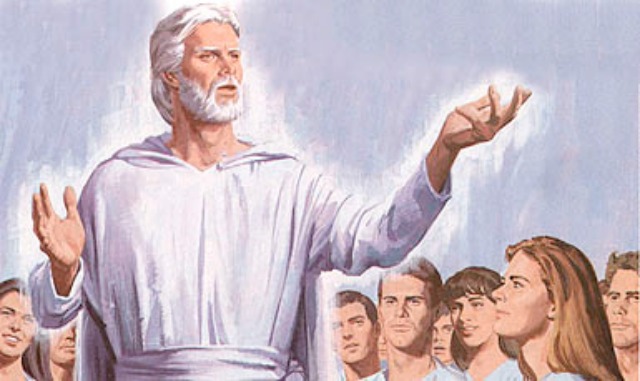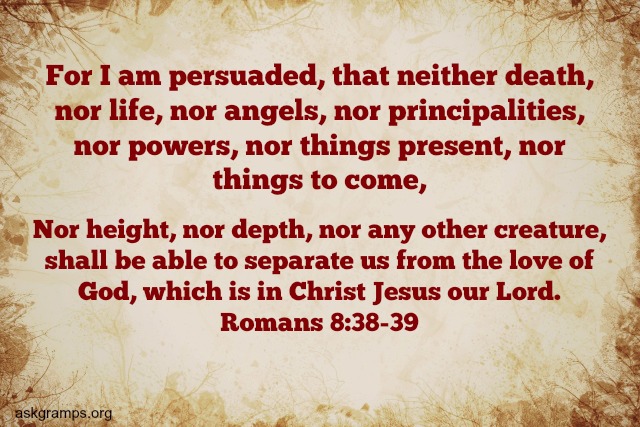Question
Gramps,
Does our Heavenly Father have a father? In other words, do we have a Heavenly Grandfather? I believe that parenthood hierarchy is an eternal law, which applies to our Deity. If so, does that mean there is a higher God above our Heavenly Father?
Steven
Answer
Steven,
Unique to tenets of The Church of Jesus Christ of Latter-day Saints are the notions of eternal progression, and that of eternal families (eternal lives). Within these tenets, as a result of modern-day revelation we have received the following, “The Church of Jesus Christ of Latter-day Saints teaches that all human beings, male and female, are beloved spirit children of heavenly parents, a Heavenly Father and a Heavenly Mother. This understanding is rooted in scriptural and prophetic teachings about the nature of God, our relationship to Deity, and the godly potential of men and women. The doctrine of a Heavenly Mother is a cherished and distinctive belief among Latter-day Saints.” (Mother In Heaven) In light of these principles a common theoretical question is asked, “Does our Heavenly Father have a Father?”
If we solely study canonized scripture as to what has been revealed pertaining to Heavenly Father we find the following: (God the Father):
1) God the Father is the Supreme Being in whom we believe and whom we worship. He is the ultimate Creator, Ruler, and Preserver of all things. He is perfect, has all power, and knows all things. He “has a body of flesh and bones as tangible as man’s” (D&C 130:22)
2) Latter-day Saints hold that God the Father is an embodied being with the attributes ascribed by the earliest Christians.
3) We are all literally children of God, spiritually begotten in the premortal life.
4) Heavenly Father is the Supreme Creator.
5) Our Father in Heaven wants us to dwell with Him eternally. His work and glory is “to bring to pass the immortality and eternal life of man” (Moses 1:39).
6) The Savior taught His disciples: “If ye had known me, ye should have known my Father also. … He that hath seen me hath seen the Father” (John 14:7, 9).
7) When one speaks of God, it is generally the Father who is referred to; that is, Elohim. All mankind are His children.
8) The God of the scriptures is a holy being. Man is commanded to be holy because God is holy (Lev. 11:44–45; 19:2). God can be known only by revelation.
9) God the Father and His Son have been manifested by voice, sight, or otherwise at various times, as at the baptism of Jesus (Matt. 3:16–17), the Transfiguration (Matt. 17:1–8), to Stephen (Acts 7:55–56), and to the Nephites (3 Ne. 11:7).
10) Latter-day revelation confirms the biblical account of God as the literal father of the human family, as a being who is concerned for the welfare of mankind and a Personage who hears and answers prayers.
11) We should seek to know our Father in Heaven.
This is the currently revealed truths we have pertaining to God the Father. There isn’t much said about God the Father. We do not know as a Church collectively, any more detail than what has been provided. All other thoughts and theories relating to our Heavenly Father are classed within theory and speculation. One tenet within our Church’s teachings is found within the following scriptures, (D&C 88:78) (D&C 97:14) “Teach ye diligently and my grace shall attend you, that you may be instructed more perfectly in theory, in principle, in doctrine, in the law of the gospel, in all things that pertain unto the kingdom of God, that are expedient for you to understand.” We are to teach and to be instructed more perfectly “in theory” as well as principle and doctrine. Let us begin with concepts that fall under “theory” or “speculation”:
1) The doctrine of eternal progression, our own (eternal companionship of husband and wife), provides a possibility that God the Father had a Father, and so on down the line.
2) Our Savior specifically said that he doesn’t, or hasn’t, done anything that his Father did not do. Was the Father, God the Father, a Savior also then?
3) Eternal lives is often described as eternal offspring. What does this exactly mean?
Let us end “theory” and “speculation” for now, and stick with what has been revealed now. If we want to know more about Heavenly Father then we need to seek personal revelation for “God [God the Father] can be known only by revelation.” Now, in your personal studies should God reveal truths to you personally about Him, then be wise and do not share what you have learned publicly. These are sacred truths given through personal avenues which should be kept sacred and revered as treasured gifts. Why? Because God the Father has a pattern of revealing truth. That pattern is that he reveals doctrine “collectively” to the whole Church through His servants the prophets. Once the leading body of the Church receive revelation then we can also share what has been revealed. I have loved this passage from Lorenzo Snow (Teachings of Presidents of the Church: Lorenzo Snow):
“President Snow later recalled, “the Spirit of the Lord rested mightily upon me—the eyes of my understanding were opened, and I saw as clear as the sun at noonday, with wonder and astonishment, the pathway of God and man. I formed the following couplet which expresses the revelation, as it was shown me…
“As man now is, God once was:
“As God now is, man may be.”
Feeling that he had received “a sacred communication” that he should guard carefully, Lorenzo Snow did not teach the doctrine publicly until he knew that the Prophet Joseph Smith had taught it. Once he knew the doctrine was public knowledge, he testified of it frequently.”
The Lord bless you in your endeavors to learn more about Him and His Father. The Lord also bless you to keep sacred those things which ought to be kept sacred. We shouldn’t be surprised by this, for even Nephi was constrained by the Spirit to keep specifics out of scripture until the Lord sees fit, according to his will and pleasure, to reveal such truths through his servants the prophets collectively to the Church.
Gramps







